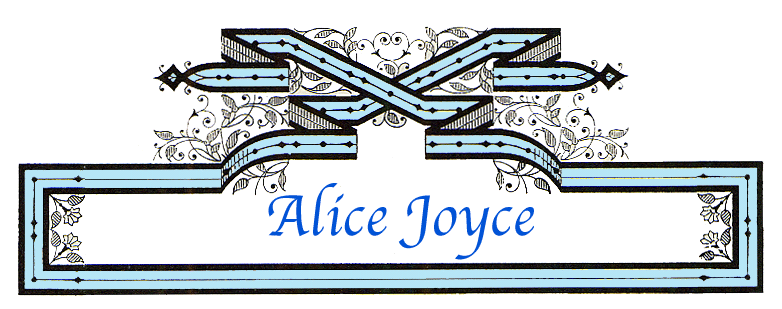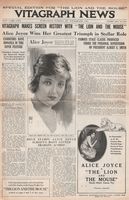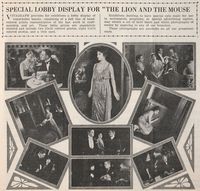

The Lion and the Mouse (1919) Vitagraph Co. of America. Distributor: Vitagraph Co. of America. Presenter: Albert E. Smith. Supervisor: Albert E. Smith. Director: Tom Terriss. Scenario: Edward J. Montagne. Camera: Joe Shelderfer. Cast: Alice Joyce, Conrad Nagel, Anders Randolf, Henry Hallam, W.T. Carlton, Mona Kingsley, Jane Jennings, W.H. Burton, Templer Saxe, Mary Carr. 6 reels
This film appears to be LOST. This was at least the second version of the film, and it was remade again by Warner Brothers as a part-talkie in 1928 with Lionel Barrymore and Dolores Costello.
| A couple of plages from the issue the Vitagraph News for February 10, 1919 featuring an article on the film and images of lobby displays (Thanks to Derek Boothroyd for these scans) |  |
 |
| Shirley Rossmore | Alice Joyce |
| Jefferson Ryder | Conrad Nagel |
| John Burkett Ryder | Anders Randolf |
| Judge Rossmore | Henry Hallam |
| Senator Roberts | T. W. Carlton |
| Kate Roberts | Mona Kingsley |
| Mrs. Ryder | Jane Jennings |
It seems rather regretful a better picture production of "The Lion and the Mouse" could not have been turned out from the material at hand. The story was particularly strong one and the title is enough to pull business to any house, but the picture turned out by the Vitagraph does not measure up to the standard. This should have been a special, but as it now stands it is only an ordinary program feature.
Tom Terris [sic] was the director, but he handled the material only fairly well. Alice Joyce, the star, does not stand out as Shirley Rossmore. It was a role that need a woman with plenty of punch, but Miss Joyce displayed none of it. She was given to posing in pretty attitudes rather than action.
Flaws in the finished production are many. An idea of what has been permitted to slip by may be gotten from the fact that in the reception scenes that there are at the finish Senator Roberts is on the scene to prevent his daughter from eloping with the fortune hunting English secretary of John Burkett Ryder. Yet a few minutes later when Shirley Rossmore beards the lion in his den and threatens to hold him up to ridicule throughout the land unless he send a wire to the Senator in Washington to call off the impeachment proceedings. Ryder sits down and drafts the wire. This with the Senator walking in a scene that preceded the wire writing by about ten minutes in the action of the play.
The production looks to be rather cheaply made. The studio stuff supposedly showing a street scene before a cafe in Paris, is too apparent and smacks of the days of picture production when Thanhouser and Lubin were grinding out single reelers.
Anders Randolf in the role of Ryder gives the best performance and walks away with practically all the honors. Miss Joyce looks pretty but that is about all. Conrad Nagel as Ryder, Jr., gave an acceptable performance. Henry Hallam, as Judge Rossmore but with little to do made his role register.
By playing up the title and pounding home that it was written by the late Charles Klein, who lost his life on the Lusitania, and was practically his masterpiece, exhibitors will attract business with the feature, but it will need a strong show around it to make it stand up.
"THE LION AND THE MOUSE"
Alice Joyce a Fascinating Heroine in Screen Version of Klein Play, Says Mantle
In two particulars, at least, Tom Terriss, director and the camera man who assisted him, have done a first-class job in transferring Charles Klein's once famous drama. "The Lion and the Mouse," to the screen for Vitagraph. The choice of the cast is all but perfect, and the photography is impressively fine, even in this day when such perfection is more or less common.
The drama itself Mr. Terriss has elected to play in the minor key of comedy rather than in the major key of stressful conflict. By doing he has rather weakened the story, but no doubt strengthened the role of Shirley Rossmore for Alice Joyce.
Hers is one of the loveliest and most appealing of screen personalities, and placidity becomes her. She accomplishes her particular dramatic effects with a minimum of effort, the downcast or languorous, prayerful or pleading eye, the furtive suggestion of tears to follow, the set mouth of determination, the flashing glance of defiance do as much for her as a display of torn passins [sic] do for many an emotionalist of twice her equipment.
Still, I must confess, a young woman who has smuggled herself into the home of a multi-millionaire, intent on stealing from him two letters that will clear her father from criminal charges falsely made against him, he being an upright jurist who has stepped on the tail of the big business octopus, would not likely conduct herself at all times as the mouse-like guest of the title. With suspicion assailing her and discovery threatened at all times she would have been at least a bit fearful and not a little anxious, thus creating a suspenseful interest in her predicament the picture does not now inspire.
However, it is a pleasant romance as it stands. Miss Joyce is a fascinating heroine, active or passive; Conrad Nagel, Alice Brady's personable leading man in "Forever After," is a fine young hero, and Anders Randolph is a perfect choice for the business buccaneer, both in appearance and exceptional acting ability. Smaller parts are credited to Mona Kingsley, T.W. Carlton, Jane Jennings and Henry Hallam. The title writer overlooked a comedy opportunity by not putting the English secretary in character, but the title writers are always doing that
WIRE REPORTS--EAST
| Box Office Value | Great |
Exhibitor Comments: "Strong Story well told and finely acted."
WIRE REPORTS--WEST
| Box Office Value | Great |
Exhibitor Comments: "Just the kind we want." "Joyce just fits part."
NAT'L BOARD OF REVIEW REPORT
| Entertainment | Good |
| Dramatic Interest | Good |
| Atmospheric Value | Excellent |
| Setting | Excellent |
| Acting | Good |
| Technical Handling | Excellent |
| Coherence | Good |
| Costuming | Excellent |
| Photography | Excellent |
| Quality | Excellent |
SYNOPSIS OF STORY
Shirley Rossmore is the daughter of Judge Rossmore, who has been removed from the bench through the influence of Ryder, a powerful financier. Shirley seeks to clear her father's name in the eyes of the world, and secures a position as secretary in the home of Ryder, in order to obtain proof against the "Wall Street lion" She manages to outwit him, and also gains his real affection. Finally she gains his consent to her marriage to his son, whom she has loved for years.
"THE LION AND THE MOUSE."
Alice Joyce Amid Rich Settings Enhances Vitagraph Production of Klein Play
Reviewed by William J. Reilly.
IN TAKING full advantage of all the possibilities of Charles Klein's play, and in presenting, besides, Alice Joyce as Shirley Rossmore in "The Lion and the Mouse," Vitagraph has given out a most attractive and pleasing picture. The story, full of genuine American interest, flows along as smoothly and deeply as a great river, sweeping out finally into a big climax.
The character of Shirley Rossmore, the real American girl, beautiful, generous, talented, devoted to her father, is a distinctively individual creation of Charles Klein. Taking on the role of Shirley, Alice Joyce draws for her interpretation from a rich store of grace and charm. She enhances the finely constructed story, entertains while it is getting under way, sustains it at all times, and when it reaches its big moments compels frank admiration for her artistic treatment of the part.
Tom Terriss, the director, shows the star amid rich surroundings, the center of beautiful settings worthy of the home of "the richest man in the world," and loses no chance to set off her winning personality. The inoffensive exhibition of a number of richly planned settings is one of the fine points of the picture.
Anders Randolf, seen in the character of the "American Octopus," John Burkett Ryder, gives a worthy interpretation of the powerful unscrupulous man of big business, and he with Conrad Nagel in the part of Jefferson Ryder give Alice Joyce able support.
Cast.| Shirley Rossmore | Alice Joyce |
| Jefferson Ryder | Conrad Nagel |
| John Burkett Ryder | Anders Randolf |
| Judge Rossmore | Henry Hallam |
| Senator Roberts | T.W. Carlton |
| Kate Roberts | Mona Kingsley |
| Mrs. Ryder | Jane Jennings |
| Judge Stott | W.H. Burton |
| Fitzroy Bagley | Templer Saxe |
From the Play by Charles Klein.
Directed by Tom Terriss.
The Story
John Burkett Ryder, "the richest man in the world," determines to discredit a judicial decision which works against the interest of his millions by discrediting its author, Judge Rossmore, and causes impeachment charges to be laid against him in Congress. Shirley Rossmore, the judge's daughter, learns of her father's trouble and returns home from Paris, where she has won success as a writer. She is loved by Jefferson Ryder, son of the magnate who is slowly killing her father. Determined to force the millionaire's hand, she publishes "The American Octopus" under a pseudonym, using Burkett's character as the central figure. He is attracted by the book and brings Shirley, whom he knows as Sarah Green, to his home to write his biography. This is the opportunity she is seeking, as it gives her a chance to obtain the two letters which will clear her father's name. Jefferson Ryder helps her secure the desired papers, but is discovered by his father and denounced as a thief. Shirley, who loves Jefferson, cannot stand to see him so branded and confesses her identity to his father. The "Lion" had long since been won by the charm of the "Mouse," and the story is cleared up in pleasing style.
Released Feb. 24
THE LION AND THE MOUSE
The photoplay at the Rialto is a screen version of Charles Klein's "The Lion and the Mouse," with Alice Joyce in the leading role. As may be remembered, the central figure in the play is Shirley Rossmore, "the mouse." Her father is a Federal Judge who, with more honesty than business intelligence, invests all of his hard-earned savings in a company and then forgets all about them. At least, he fails to keep track of the company and does not know when it is absorbed by a larger corporation. The larger corporation is involved in litigation before him and he decides in its favor. The is what John Burkett Ryder, "the lion" has been waiting for. He wants to "get" the Judge and has him accused of deciding the case in his own favor. No one believes that the Judge has been stupid enough not to recognize the foster parent of his own company.
But the Judge had written Ryder two letters which would show that he was innocent, provided Ryder did not deny he had ever received them and charge that the Judge had written them after committing his alleged crime. Shirley and her family become obsessed with the idea that these letters would be acceptable as evidence, so she sets to work to obtain them from Ryder. She spends most of the play trying to get them, and when she finally gets them she does not use them. She is able to frighten Ryder into letting up on her father instead. And she marries Ryder's son, too.
Miss Joyce, as the "mouse" was as human and effective as her role permits, and Tom Terriss, the director of the production, obtained a number of striking photographic effects.
Last revised Januayr 1, 2015